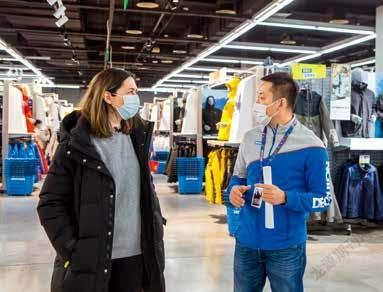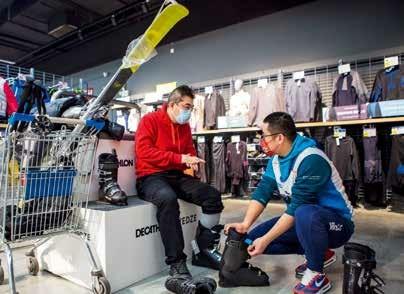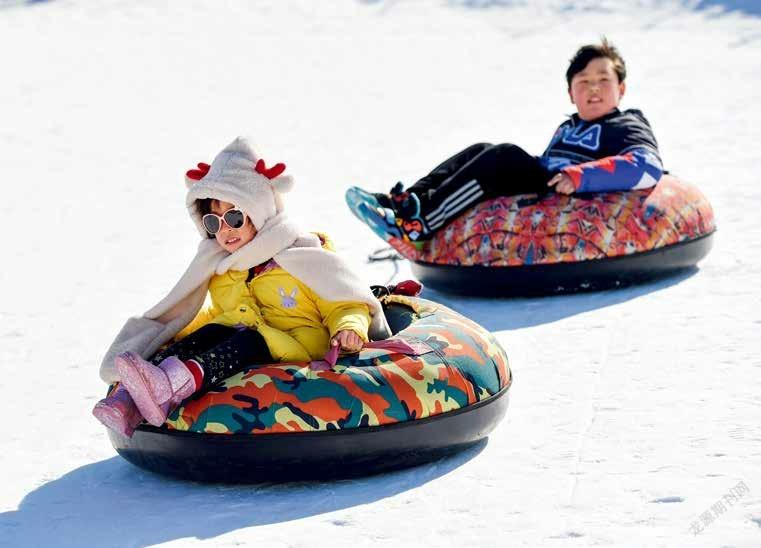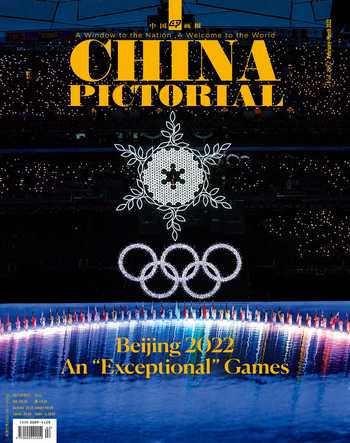Winter Sports Fever in China
by Cecile Zehnacker

The Beijing Winter Olympic Games have rippled a sporty atmosphere across China. The entire country was enthusiastic to see athletes from around the world compete.
Seeking to soak up some Olympic spirit and see how sports habits have evolved in China in recent years, my colleagues and I ventured to Decathlon Dajiaoting, which became Beijing’s first sports equipment megastore in 2006 with over 80 sports categories.
As a French, I have been familiar with the France-based Decathlon chain my entire life. It has been a go-to place for French people to find affordable and quality sports clothes and equipment for a long time. Decathlon was founded in 1976 with a simple but powerful goal: democratize access to sports. The very name Decathlon comes from an athletics discipline that combines 10 different track-and-field sports in one event: four runs, three jumps, and four throws. This cross-disciplinary sport has been part of the Olympic Games since 1904.
The retail brand first expanded to other European countries and then all over the world. The first Chinese store opened in 2003 in Shanghai. Nowadays, Beijing alone has 16 stores and there are 280 all over China, compared to 28 stores in the entire country just 10 years ago.
Just like other foreign brands, Decathlon has adopted a specific strategy to address the Chinese market, which is developing and evolving fast. Decathlon made its mission to help people explore all kinds of sports and increase sports practice in China. To help consumers discover new activities, every Decathlon store in China includes some small training areas where children and adults can try different disciplines before investing in the necessary equipment.
Another nuance of the Chinese market is e-commerce, which represents a very large chunk of sales. Ten years ago, almost all sales were done offline, but online sales have increased quickly over the past seven or eight years. Online development is crucial for any brand seeking to expand in China. Decathlon collaborates with tech giants such as Tencent and Alibaba to reach every e-commerce platform and cater to all consumer needs.

Wu Tong, manager of Decathlon Dajiaoting in Beijing, is quite familiar with the brand’s growth. His 10-year experience of working at the store made him a first-hand witness to the evolution of sports fever among Chinese people. While some mainstream activities like hiking and swimming remain very popular, ever since Beijing won the bid to host the 2022 Winter Olympics in 2015, Wu noticed Chinese people’s growing interest in winter sports, especially skiing and snowboarding. He started snowboarding when he joined the company after learning about it from coworkers and customers. He is now an avid snowboarder, which makes it easier for him to endorse winter sports and connect with customers.

Children’s sports education is flourishing in China, and parents spend a lot of time and resources on it. With the growing popularity of winter sports nationwide, more and more parents bring their kids to skiing and snowboarding classes at ski resorts. Sales of winter sports equipment have been growing accordingly. Although children contribute the largest part of sales, young adults are also showing interest in trendy sports. In this context, Decathlon Dajiaoting offers a comprehensive range of sports equipment for beginners, intermediate, and advanced levels, and some of its bestsellers are actually accessories. Compared to yesterday’s skiers who primarily sought adrenaline, skiers now are more concerned with safety and tend to invest more in protective equipment such as helmets and goggles. Decathlon has adapted its offerings to match their needs and tastes. The brand also partners with ski resorts and government initiatives to organize events and training classes at the city level. These events include training classes and promotional events to attract more sports fans, including a lot of families.

On its founding anniversary, each Decathlon store also organizes special field activities aimed at assisting disabled and impoverished people via providing equipment and organizing local events in schools and villages. Wu joined a founding-day event a couple of years ago. He and his colleagues visited a school for disabled children. The team brought suitable equipment and organized activities for the children to practice sports, enjoy entertainment, and share experience and knowledge. He remembers how proud the employees were to participate in the event, and the kids were so happy that some even cried when the team had to leave. In China, just like everywhere else, sports bring people together.

